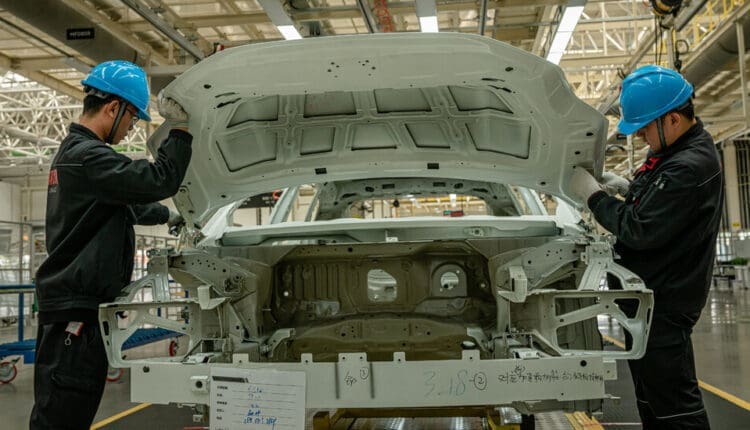
New Tariffs on Chinese Electric Vehicles to be Announced by U.S.
TL/DR –
The Biden administration plans to impose new tariffs on Chinese electric vehicles and other goods to prevent China from undermining domestic manufacturing of clean energy products. Tariffs would rise as high as 100% on Chinese electric vehicles, making them prohibitively expensive to purchase, and additional import taxes would be levied on semiconductors. This move follows a four-year review of the tariffs President Trump imposed on over $300 billion of Chinese imports in 2018, revealing a plan to surpass those tariffs in areas subsidized by the 2022 Inflation Reduction Act.
Biden Administration Expected to Announce New Tariffs on Chinese Electric Vehicles
The Biden administration is set to announce new tariffs on Chinese electric vehicles as high as 100%, and other Chinese goods such as semiconductors, as early as next week, according to sources. This move aims to shield domestic manufacturing of clean energy products from being undercut by China’s cheap products.
The proposed tariffs follow a four-year review of the levies President Donald J. Trump imposed on $300 billion of Chinese imports in 2018. The Biden administration plans to maintain most of these and enforce higher levies on areas the president supported in the 2022 Inflation Reduction Act. This includes raising the current 25% tariff on Chinese electric vehicles to potentially 100%.
Mr. Biden has previously expressed concerns about Chinese electric vehicles, considering them a risk to national security. The new tariffs aim to protect American manufacturing.
The fate of the tariffs has caused debate within the White House, especially with China’s increase in production of electric vehicles, lithium batteries, and solar panels. This has reignited trade tensions, prompting Mr. Biden to consider more aggressive trade restrictions.
There is uncertainty about the extent of the expected tariffs on Chinese electric vehicles, batteries, and solar products. These will not likely apply to traditional gasoline-powered cars made in China.
Strategic Tariffs on Semiconductors and Other Measures
New levies are also projected on semiconductors, which Mr. Biden aimed to enhance with the bipartisan CHIPS and Science Act 2022. Democrats, like Senator Sherrod Brown of Ohio, have been urging the Biden administration to protect the U.S. automobile industry. Last month, Mr. Brown called for Chinese electric vehicles to be excluded from the United States, claiming they pose an “existential threat” to American automakers.
Mr. Biden requested the trade representative to also raise tariffs on imported steel and aluminum products from China, accusing them of selling these at artificially low prices worldwide. The U.S. solar industry has lobbied for new tariffs on Chinese imports due to an influx of cheap solar panels and components.
In response, China’s Ministry of Foreign Affairs criticized the prospect of new U.S. tariffs, arguing that they violate the World Trade Organization’s rules.
Section 301 Tariffs and the U.S.-China Trade Agreement
The United States and China agreed to a “Phase 1” trade agreement during the Trump administration in 2020, allowing each country to review bilateral tariffs after four years. The United States deferred the outcome of its review after the four-year mark. According to Greta Peisch, a former general counsel at the U.S. trade representative’s office, without higher tariffs, the U.S. auto sector may not compete with heavily subsidized Chinese electric cars.
Keith Bradsher contributed reporting.
—
Read More US Political News
